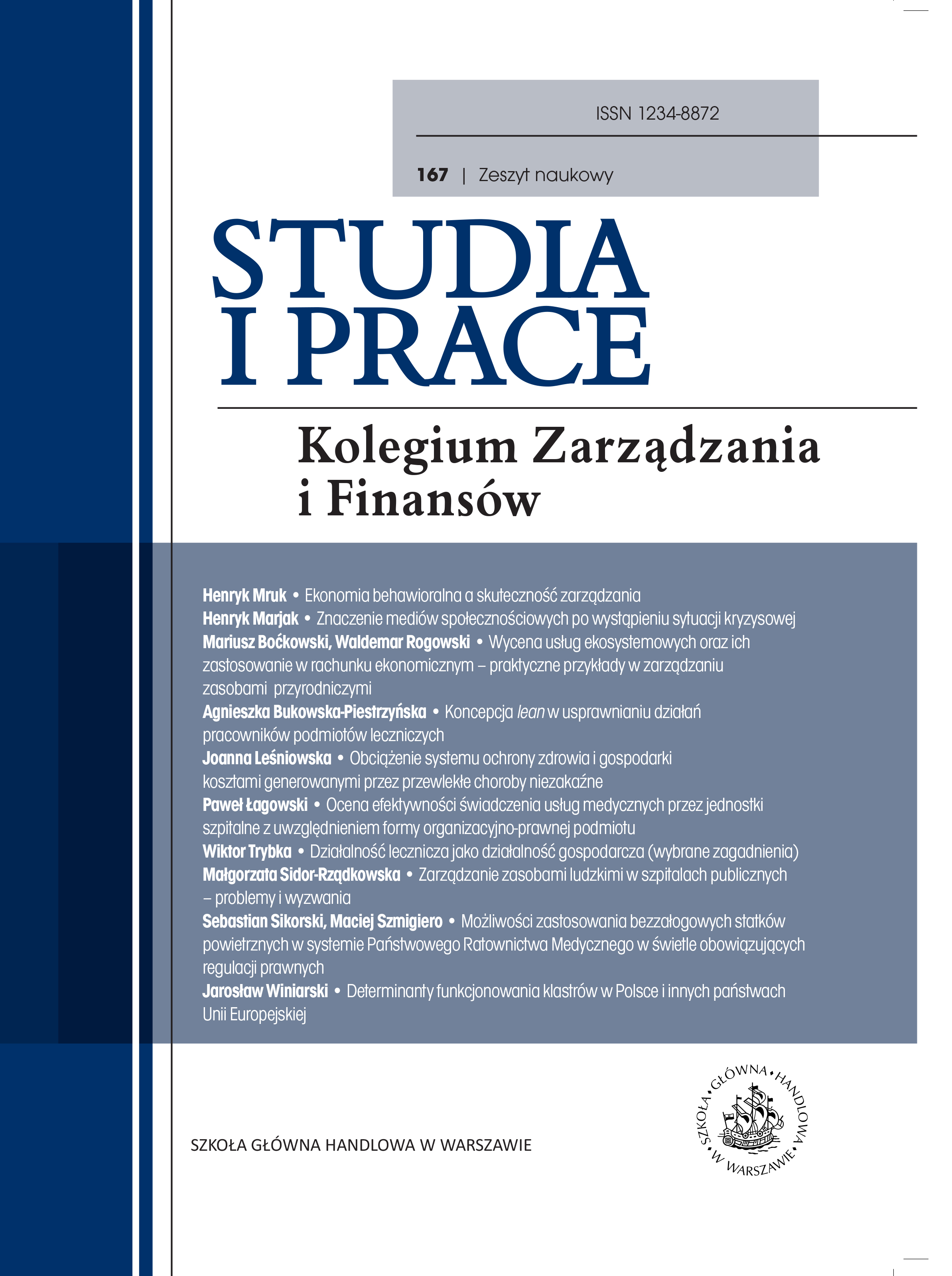Lean Concept in Improving the Efficiency of the Staff of Healthcare Entities
DOI:
https://doi.org/10.33119/SIP.2018.167.4Keywords:
healthcare entity, lean management, 5S, kaizenAbstract
The efficiency of the healthcare sector is linked not only with outlays directly spent on it but also with optimal performance in medical and non-medical fields. By eliminating obsolete activities of the staff, we may improve the operations of a healthcare entity. The paper lists three types of waste that we may come across in a medical institution. By knowing them, we may suggest how they can be reduced. An assumption was made that according to the lean concept one may rationalise processes of a healthcare operator, which is why the substance, tools, and benefits of the application of the idea by the staff of a healthcare entity (e.g. shorter lead time for individual processes, fewer work-consuming processes and increasing staff productivity) are discussed in this paper. This is a theoretical paper. Research method is based on desk studies.
Downloads
References
2. Burgess N., Radnor Z., Evaluating lean in healthcare, „International Journal of Health Care Quality Assurance” 2013, Vol. 26.
3. Connaughton S. A., Lean Manufacturing, EBSCO Research Starters, EBSCO Publishing Inc., 2008.
4. Golinowska S., Polityka społeczna państwa w gospodarce rynkowej: studium ekonomiczne, Wydawnictwo Naukowe PWN, Warszawa 1997.
5. Graban M., Lean Hospitals. Doskonalenie szpitali. Poprawa jakości, bezpieczeństwo pacjentów i satysfakcja personelu, ProdPublishing, Wrocław 2011.
6. Grzesiak S., Efektywność funkcjonowania przedsiębiorstwa – aspekty prakseologiczne i ekonomiczne [w:] Przedsiębiorstwo na rynku. Gospodarka polska w procesie transformacji systemowej, Szczecin 1996.
7. Hino S., Inside the Mind of Toyota, Productivity Press, Nowy Jork 2006.
8. Lisińki M., Ostrowski B., Lean management w restrukturyzacji przedsiębiorstwa, Antykwa, Kraków–Kluczbork 2006.
9. Lichtarski J. (red.), Podstawy nauki o przedsiębiorstwie, Akademia Ekonomiczna we Wrocławiu, Wrocław 1999.
10. Locher D., Lean w biurze i usługach. Przewodnik po zasadach szczupłego zarządzania w środowisku pozaprodukcyjnym, MT Biznes, Warszawa 2012.
11. Majorana F., Morelli A., Lean banking, Wydawnictwo M, Kraków 2012.
12. Mann D., Creating a Lean Culture. Tools to Sustain Lean Conversions, Productivity Press, Nowy Jork 2005.
13. Masaaki I., Kaizen: Klucz do konkurencyjnego sukcesu Japonii, MT Biznes, Warszawa 2007.
14. Protzman Ch., Mayzell G., Kerpchar J., Leveraging Lean in Healthcare. Transforming Your Enterprise into a High Quality Patient Carre Delivery System, Productivity Press, Taylor and Francis Group LLC, Nowy Jork 2011.
15. Womack J. P., Jones D. T., Lean thinking – szczupłe myślenie, ProdPublishing.com, Wrocław 2008.
16. Ustawa o działalności leczniczej z 15 kwietnia 2011 r. (Dz.U. nr 112 poz. 654 z 2013 r. z późn. zm.).
17. Ustawa z dnia 27 sierpnia 2004 r. o świadczeniach opieki zdrowotnej finansowanych ze środków publicznych (Dz.U. z 2008 r. nr 164 poz. 1027 z późn. zm.).
18. Radnor Z., Transferring Lean into Government, „Journal of Manufacturing Technology Management” 2010, Vol. 21, No. 3.
19. www.pl.kaizen.com/10363.html (02.09.17).
20. Finanse NFZ; www.nfz.gov.pl/bip/finanse-nfz [dostęp: 25.09.2017].
21. Björnberg A., Europejski Konsumencki Indeks Zdrowia w 2016 r. Raport, Health Consumer Powerhouse 2017; www.piu.org.pl/wp-content/uploads/2017/07/Europejski-Konsumencki--Indeks-Zdrowia-2016.pdf [dostęp: 25.09.2017].









